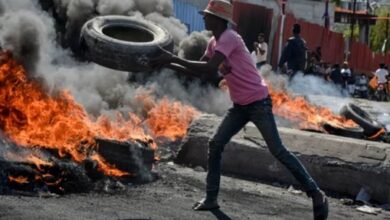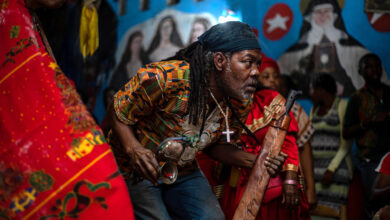Haitian Prime Minister Ariel Henry has emphasized his commitment to improving border control and resuming dialogue with the Dominican Republic to address the escalating tensions caused by the controversial canal construction on their shared border.

Photo: X @DrArielHenry
The Latin American Post Staff
Escucha este artículo
Leer en español: Primer Ministro de Haití busca diálogo con República Dominicana sobre disputa fronteriza
Geopolitical Dynamics Unfold: A Historical Perspective
In the complex geopolitical landscape of the Caribbean, the island of Hispaniola, shared by Haiti and the Dominican Republic, has often been a stage for historical and political drama. The latest act in this ongoing narrative is the commitment by Haitian Prime Minister Ariel Henry to engage in dialogue with the Dominican Republic, aiming to ease the tensions that have flared up over the construction of a canal on a border river.
This commitment follows a long history of strained relations between the two nations, marked by cultural, political, and economic differences. Haiti's recent construction of a canal on the border river Masacre (known as Dajabón in the Dominican Republic) has further strained these relations, leading to a series of retaliatory actions by the Dominican Republic, including the closure of borders and suspension of visa issuance.
In a move to address this deepening rift, Prime Minister Henry convened a meeting with local authorities in Haiti's northeastern region. This gathering was not just another bureaucratic exercise; it was a critical step in reaffirming Haiti's stance on the equitable exploitation of shared water resources by international treaties. The meeting, described as significant by the Haitian cabinet, aimed to assess the evolution of the border situation and explore sustainable solutions to the dispute.
Historical Complexities: Roots of Haitian-Dominican Relations
This border conflict is not an isolated incident but a reflection of the longstanding complexities characterizing Haitian-Dominican relations. Hispaniola's shared history dates back to the colonial era, with the French and Spanish empires dividing the island into two distinct colonies. This division laid the groundwork for two very different national identities. Haiti gained independence in 1804 as the world's first black-led republic, and the Dominican Republic followed suit in 1844.
Over the centuries, the relationship between the two nations has been punctuated by conflicts and tensions fueled by differences in language, culture, and economic development. The border, a 224-mile-long demarcation, has often been a flashpoint, with issues of migration, trade, and environmental management creating friction.
The construction of the canal on the Masacre River is the latest in a series of contentious issues. For Haiti, the canal represents an effort to manage its water resources more effectively, a critical need for a country grappling with environmental challenges and economic hardship. However, for the Dominican Republic, this construction is seen as a unilateral decision that violates their shared water rights and poses ecological risks.
The Dominican Republic's response to the canal's construction, including the total border closure and suspension of visa issuance, has significant implications. It disrupts bilateral trade and affects people's lives on both sides of the border. In response, Haiti has refused to resume the binational market and halt the canal construction, further deepening the impasse.
Call for Dialogue: Prime Minister Henry's Vision
In this context, Prime Minister Henry's call for dialogue and a collective approach is a beacon of hope. His emphasis on avoiding individual decisions and fostering a consensual strategy aligns with a broader vision of peaceful coexistence and cooperation. The engagement with local authorities underscores the importance of a unified stance in dealing with international disputes.
The intervention of the Organization of American States (OAS) in this matter, through the appointment of a commission to evaluate the situation around the canal, signifies the international community's recognition of the dispute's gravity. This move by the OAS is about more than resolving a specific issue. Still, it also indicates the need for a regional approach to address the shared challenges faced by Caribbean nations.
The Haiti-Dominican Republic border dispute is about more than just a canal. It manifests deeper historical grievances, socioeconomic disparities, and a quest for sovereign control over natural resources. It highlights the need for a collaborative approach to resource management, especially in a region prone to environmental vulnerabilities.
International Mediation: A Crucial Role
As Haiti and the Dominican Republic navigate this complex dispute, the role of international bodies like the OAS becomes crucial. Their involvement could provide a neutral dialogue platform, helping mediate the conflict and foster mutual understanding. This dispute also underscores the importance of adhering to international treaties and agreements, ensuring that actions taken by one nation do not detrimentally affect its neighbor.
Also read: DEA Informant Admits Role in Haiti President's Assassination
Prime Minister Ariel Henry's commitment to dialogue with the Dominican Republic is a positive step towards resolving a longstanding issue with regional stability and cooperation implications. The resolution of the canal dispute could set a precedent for how Caribbean nations manage shared resources and address cross-border challenges. As both countries move towards a potential resolution, the international community's role in facilitating dialogue and ensuring that agreements are respected will be pivotal. The path ahead is complex, but with a renewed focus on dialogue and cooperation, there is hope for a peaceful resolution that respects the rights and needs of both nations.





